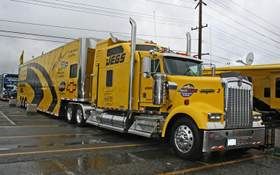New Driver Pay
Topic 5147 | Page 1

Most schools will not pat you while in the school, you start getting some money when you get into your trainers truck running loads. After you get your own truck pay varies company to company. Regardless of what they pay per mile you still need to get miles so keep that in mind.
Here is an example, right now SWIFT pays new drivers .33 cents per mile, so if you drive 2000 miles that week you make 660 net. Most of the SWIFT drivers i have talked to say they get on average 2400-2800 per week over the course of a year, some get more. What i have been doing is running though in my head how much i would like to make and how much i have to make.
You just got to find out what ou can live with and make it your goal, but keep in min you will not make much until you are in your own truck.

I think Eckoh means 33cpm, not .33cpm ...
For any profession, making a change is quite a financial leap and you do have to plan a bit. You may have to save up for a while, to cover your costs in transition. There are many options out there, though.
For example, Con-way Freight will take a dock-worker who's been there for a minimum of 90 days, and if he qualifies for the program, will accept him into their 12-week driver training program, at no extra cost to the trainee. The dock-workers make $16/hr before and during the training program. They work 8 hours on the dock and spend 4 hours either in the classroom or in the yard, practicing their driving skills. Once they finish the program, (at least at my terminal) and they pass the course, they get a raise that jumps to $21.87/hr. Their commitment to the company is that they sign a contract stating they will drive for Con-way Freight for at least 12 months, following the completion of the 12-week program.
I entered Con-way, having already been through a private CDL school, which I funded through my state workforce WIA program. The state paid for the school, then I had to job-hunt. However, I was not employed during the full-time school, so I was not pulling in a paycheck and I still had to pay for fuel to get there. Although the state paid tuition, my out-of-pocket expenses added up to about $1,000. Granted, I can claim a lot on taxes but I won't reap that benefit for another year. Once I got into Con-way, I began a 5-week driver training program, during which they paid me $874 per week. These numbers vary from terminal to terminal. For example, the $21.87 was based on a recent raise at that terminal but the Colorado Springs terminal did not experience such a raise, nor do they have a training program for drivers. It's just a small terminal.
Other companies like Swift and Prime take a non-CDL driver and train him from the ground up. I don't know what they pay during training but I believe it's a bit less. I got paid a little more, however, I wasn't getting paid anything while I went to CDL school and then it took me 6 weeks to get a job, plus another 2 weeks before my first pay-check came in. Eleven weeks, from start to finish till my first paycheck.
You can also opt to go to a private school that takes a little longer to complete, say, over several months because you're only in school on the weekends. If this is the only option for you, I understand, but I believe that allows too much time during the week, in between classes, for you to absorb what you've learned whereas a school that's full-time, straight through till you finish, is better.
Also, go to the links on this site Company-Sponsored Training and Truck Driving Schools and even How To Choose A School and How To Choose A Company for more comprehensive guidance. Use the High Road Training Program and don't forget to click on Understanding Pre-Hires . This site is a tremendous resource for getting started.
Do keep in mind that the truck you just bought is paramount in continuing any career. It gets you to work and you cannot afford to lose it, so make your plans in such a way that does not leave you too broke to make payments or to get anywhere. Believe me: this is extremely important. Whatever you do, keep those payments current so you have a means to earn your lively-hood and to make a career change if you want. If that means delaying trucking a bit, so be it, but your vehicle is essential to all your options.
Good luck and stick around. This website is invaluable.
-mountain girl
CDL:
Commercial Driver's License (CDL)
A CDL is required to drive any of the following vehicles:
- Any combination of vehicles with a gross combined weight rating (GCWR) of 26,001 or more pounds, providing the gross vehicle weight rating (GVWR) of the vehicle being towed is in excess of 10,000 pounds.
- Any single vehicle with a GVWR of 26,001 or more pounds, or any such vehicle towing another not in excess of 10,000 pounds.
- Any vehicle, regardless of size, designed to transport 16 or more persons, including the driver.
- Any vehicle required by federal regulations to be placarded while transporting hazardous materials.
Terminal:
A facility where trucking companies operate out of, or their "home base" if you will. A lot of major companies have multiple terminals around the country which usually consist of the main office building, a drop lot for trailers, and sometimes a repair shop and wash facilities.
CPM:
Cents Per Mile
Drivers are often paid by the mile and it's given in cents per mile, or cpm.
Pre-hire:
What Exactly Is A Pre-Hire Letter?
Pre-hire letters are acceptance letters from trucking companies to students, or even potential students, to verify placement. The trucking companies are saying in writing that the student, or potential student, appears to meet the company's minimum hiring requirements and is welcome to attend their orientation at the company’s expense once he or she graduates from truck driving school and has their CDL in hand.
We have an excellent article that will help you Understand The Pre-Hire Process.
A Pre-Hire Letter Is Not A Guarantee Of Employment
The people that receive a pre-hire letter are people who meet the company's minimum hiring requirements, but it is not an employment contract. It is an invitation to orientation, and the orientation itself is a prerequisite to employment.
During the orientation you will get a physical, drug screen, and background check done. These and other qualifications must be met before someone in orientation is officially hired.
Pre-hires:
What Exactly Is A Pre-Hire Letter?
Pre-hire letters are acceptance letters from trucking companies to students, or even potential students, to verify placement. The trucking companies are saying in writing that the student, or potential student, appears to meet the company's minimum hiring requirements and is welcome to attend their orientation at the company’s expense once he or she graduates from truck driving school and has their CDL in hand.
We have an excellent article that will help you Understand The Pre-Hire Process.
A Pre-Hire Letter Is Not A Guarantee Of Employment
The people that receive a pre-hire letter are people who meet the company's minimum hiring requirements, but it is not an employment contract. It is an invitation to orientation, and the orientation itself is a prerequisite to employment.
During the orientation you will get a physical, drug screen, and background check done. These and other qualifications must be met before someone in orientation is officially hired.
Company-sponsored Training:
A Company-Sponsored Training Program is a school that is owned and operated by a trucking company.
The schooling often requires little or no money up front. Instead of paying up-front tuition you will sign an agreement to work for the company for a specified amount of time after graduation, usually around a year, at a slightly lower rate of pay in order to pay for the training.
If you choose to quit working for the company before your year is up, they will normally require you to pay back a prorated amount of money for the schooling. The amount you pay back will be comparable to what you would have paid if you went to an independently owned school.
Company-sponsored training can be an excellent way to get your career underway if you can't afford the tuition up front for private schooling.
HOS:
Hours Of Service
HOS refers to the logbook hours of service regulations.OWI:
Operating While Intoxicated
OOS:
When a violation by either a driver or company is confirmed, an out-of-service order removes either the driver or the vehicle from the roadway until the violation is corrected.
Josh, the safe number for that first year salary is about $35k. You can pretty much count on that. It will be tough getting $40k or above that first year. You'll make about $40k your second year and it will top off around $50k-$55k between years 3 and 5. There are always a few outliers where you might get lucky and land a better paying job but it's quite uncommon and it isn't something you can count on happening.
The biggest change by far will be the lifestyle.

This is what Schneider told me for intermodal regional out of Chicago.
Orientation is 3 weeks long, and will earn $80 a day. You will receive 2 meals while in the class room, but when out with a training engineer you would be responsible for your meals. Your first paycheck will be held back 1 week. You are paid every Friday except the first check.
Pay: .37 Rate per mile *Pay is subject to the verification of your tractor-trailer driving experience. Mileage pay (if mileage pay is applicable to your particular pay package) applies to all loaded and empty carrier-directed miles based on Household Movers Guide or PC*MILER, as determined by Schneider's particular Line of Business (LOB). Pay is also subject to your available DOT hours of service, load and work availability, per diem participation, other criteria established by the LOB, account type, economic fluctuations, business circumstances, applicable law, and other relevant considerations.
They also said .5 cents increase within 30 days depending on on time delivers 1800-2200 miles per week.
Regional:
Regional Route
Usually refers to a driver hauling freight within one particular region of the country. You might be in the "Southeast Regional Division" or "Midwest Regional". Regional route drivers often get home on the weekends which is one of the main appeals for this type of route.
DOT:
Department Of Transportation
A department of the federal executive branch responsible for the national highways and for railroad and airline safety. It also manages Amtrak, the national railroad system, and the Coast Guard.
State and Federal DOT Officers are responsible for commercial vehicle enforcement. "The truck police" you could call them.
Intermodal:
Transporting freight using two or more transportation modes. An example would be freight that is moved by truck from the shipper's dock to the rail yard, then placed on a train to the next rail yard, and finally returned to a truck for delivery to the receiving customer.
In trucking when you hear someone refer to an intermodal job they're normally talking about hauling shipping containers to and from the shipyards and railyards.
Per Diem:
Getting paid per diem means getting a portion of your salary paid to you without taxes taken out. It's technically classified as a meal and expense reimbursement.
Truck drivers and others who travel for a living get large tax deductions for meal expenses. The Government set up per diem pay as a way to reimburse some of the taxes you pay with each paycheck instead of making you wait until tax filing season.
Getting per diem pay means a driver will get a larger paycheck each week but a smaller tax return at tax time.
We have a ton of information on our wiki page on per diem pay
1800-2200 miles per week is extremely conservative, especially for a top tier driver. If you show you're willing to work hard, you're safe, and you're reliable you can expect closer to 2700-3200 miles per week once you've adapted to the road a little bit and proven yourself. I'd say within a couple of months you should be seeing those kind of miles consistently in almost any division you're in if you want them and you've earned that level of trust from the company.
For OTR (home a few days a month) or regional runs (home weekends) I'd say you can bank on about 110,000 total miles that first year. When you factor in time off, breakdowns, and some slow weeks that's probably a good estimate to use. For intermodal I'm really not sure. It could vary wildly.
Regional:
Regional Route
Usually refers to a driver hauling freight within one particular region of the country. You might be in the "Southeast Regional Division" or "Midwest Regional". Regional route drivers often get home on the weekends which is one of the main appeals for this type of route.
OTR:
Over The Road
OTR driving normally means you'll be hauling freight to various customers throughout your company's hauling region. It often entails being gone from home for two to three weeks at a time.
Intermodal:
Transporting freight using two or more transportation modes. An example would be freight that is moved by truck from the shipper's dock to the rail yard, then placed on a train to the next rail yard, and finally returned to a truck for delivery to the receiving customer.
In trucking when you hear someone refer to an intermodal job they're normally talking about hauling shipping containers to and from the shipyards and railyards.
HOS:
Hours Of Service
HOS refers to the logbook hours of service regulations.New Reply:
New! Check out our help videos for a better understanding of our forum features

















Preview:








 TT On Facebook
TT On Facebook
Iam getting ready to quit my $18 hr factory to and go into trucking.I have had some people tell me there is no money in trucking and I will get lied to about pay and recruiters saying Ill gross $950 a week.Thing is I just bought a $20,000 truck and still need to pay that along with other bills,can I do that starting out?Iam need to gross at least $700 a week is that realistic? I have been talking to Knight and they will pay for my training to get my CDL while at training I will get pre tax $400 a week and then $400 a week while with a trainer for 4-6 weeks.Any suggestions on how I can make good money starting out in my first year? Any trucking companies that you had a good/bad experience with? I need any advice I can get I feel like the requiter is talkng a good 1 and sounds to good to be true.I just dont wanna quit my job and start driving and only take home 2 -3 hundred a week.Thanks in advance !
CDL:
Commercial Driver's License (CDL)
A CDL is required to drive any of the following vehicles: